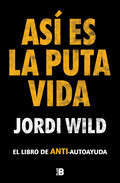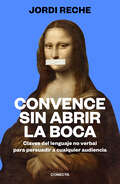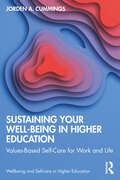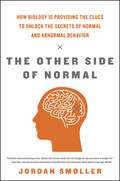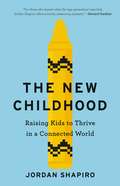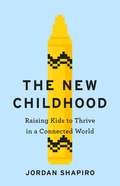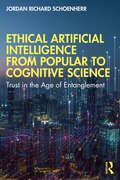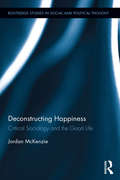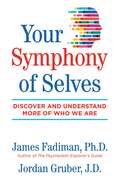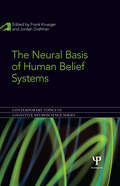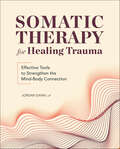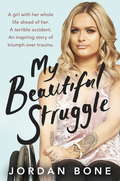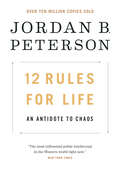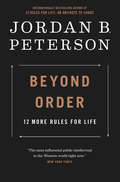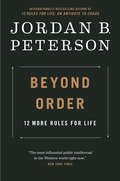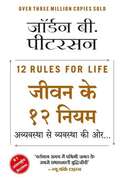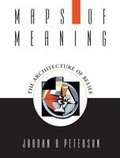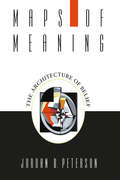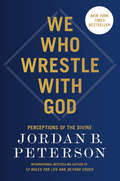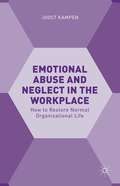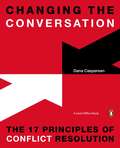- Table View
- List View
Así es la puta vida: El libro de ANTI-autoayuda
by Jordi WildEl esperado libro de Jordi Wild, uno de los youtubers más populares de España y creador de The Wild Project, el pódcast más escuchado. Ni eres el centro del universo ni todos tus sueños van a cumplirse. Olvídate de las chorradas de los libros de autoayuda y de los gurús baratos que intentan hacerte creer que «si quieres, puedes»; de los crypto bros que te harán millonario sin trabajar y de los que te dicen que seas tu propio jefe mientras se graban en la piscina de la casa de sus padres. Aquí no encontrarás recetas mágicas ni los cinco pasos que tienes que seguir para SER FELIZ. Eso se lo dejo a los que se quieren aprovechar de ti. En este libro te voy a contar lo que para mí es la vida de verdad, sin edulcorantes ni azúcares añadidos; la jodida (y maravillosa) lucha que tienes que librar cada día para poder disfrutar y realizarte. La vidate dará una buena somanta de hostias, eso es inevitable, pero de ti depende levantarte y seguir guerreando. Vale la pena, te lo aseguro. ASÍ ES LA PUTA VIDA. ESPERO QUE ESTÉS PREPARADO PARA ACEPTARLO.
Convence sin abrir la boca: Claves del lenguaje no verbal para persuadir a cualquier audiencia
by Jordi RecheDescubre las claves del lenguaje no verbal para cautivar y persuadir a cualquier audiencia y en cualquier situación. En el entorno personal y profesional, nuestros gestos, miradas, posturas, sonrisas... dicen más de nosotros que las palabras que pronunciamos. Porque el lenguaje del cuerpo es revelador: cómo nos sentamos, cómo caminamos, cómo saludamos..., todo comunica. Los demás interpretan y recuerdan nuestros mensajes por lo que transmitimos a nivel visual mucho más que por lo que decimos. Pero ¿sabes qué expresas con tu cuerpo? Jordi Reche te descubre los secretos del lenguaje no verbal: qué significa cada gesto, por qué lo haces y cómo interpretarlo tanto en ti mismo como en los demás. Convence sin abrir la boca te proporciona las herramientas para dominar el lenguaje corporal y conectar con tus interlocutores. Aprende a utilizarlas para ser más convincente y persuasivo, transmitir mayor seguridad y confianza, y ganar influencia entre quienes te rodean. En este libro aprenderás: * A comunicar mejor, reforzando tu mensaje hablado con tu gestualidad. * A tener mayor consciencia de tu cuerpo y a utilizarlo para sentirte mejor y para que, quienes te rodean, te vean mejor. * A leer en los gestos de los demás información que han decidido no darte u ocultarte, o simplemente a descifrar que te están mintiendo.* A descubrir que tu poder de persuasión puede aumentar de manera significativa si cuidas tu lenguaje no verbal de líder. * A conocer mejor los mensajes que envían tus fotos de perfil, tus fotos grupales o los vídeos que cuelgas en las redes. * A detectar las emociones reales de una persona, más allá de lo que nos cuente con sus palabras. * A aumentar tu capacidad de seducción y a leer en el cuerpo de las personas con las que te relacionas si estás atrayendo su atención de manera positiva o no. Reseñas:«Con el libro de Jordi puedes aprender tanto a leer a los demás como a mejorar tu comunicación de una forma amena y entretenida. Puedes usarlo siempre que quieras para mejorar y llevar tu comunicación y conocimiento a otro nivel que no muchos conocen».Jose Fernández @soycriminologo. Experto en criminología y comportamiento no verbal«Jordi ha condensado en un libro una gran cantidad de trucos y técnicas para entender cómo funciona la comunicación no verbal. Esto permite que lo apliques es muchos ámbitos: en negociaciones, ventas, formaciones... Es un manual didáctico y directo que te ayudará a iniciarte de lleno en el apasionante mundo de la comunicación».Fernando Miralles. Formador y divulgador experto en oratoria«Jordi te explica paso a paso todo lo que cualquier comunicador debería saber, ya sea hablando con un cliente o frente a miles de espectadores. Sin duda, una caja de herramientas que todo profesional debería leer. Un título obligatorio para cualquiera que desee destacarse en su carrera».Nico Fernández Miranda. Empresario, conferencista y profesor universitario«En este mundo tan expeditivo Jordi nos enseña no solo cómo mejorar nuestro lenguaje corporal sino también cómo leer a quienes tenemos enfrente, esto nos ayudara luego a complementar nuestro objetivo final en una reunión o quizás en esa charla incomoda que tanto evadimos. Aquí aprenderás cómo congeniar eso que quieres decir no solo con palabras si no con todo tu cuerpo».Evelina Cabrera. Entrenadora de fútbol, coach deportivo y escritora
Dolor crónico: Procedimiento de evaluación e intervención psicológica
by Jordi Miró MartínezEl dolor es un tema de especial relevancia. Su misma existencia resulta un reto para los profesionales de la salud, no en vano es la principal causa de búsqueda de atención médica y sanitaria. El estudio y tratamiento del dolor se ha convertido en un campo de encuentro de profesionales de disciplinas científicas diversas. En este libro se analizan las aportaciones de la Psicología y la situación actual de su relación con el dolor crónico. Se trata de presentar e instruir al lector interesado sobre los procedimientos de evaluación y técnicas de intervención que existen y de sus resultados, así como de detallar las bases teóricas que los sustentan. El autor ofrece una guía para la evaluación y el tratamiento de los problemas de dolor crónico, y plantea y responde a cuestiones de importancia para el futuro del área.
Sustaining Your Well-Being in Higher Education: Values-Based Self-Care for Work and Life (Wellbeing and Self-care in Higher Education)
by Jorden CummingsThis book provides an evidence-based approach to sustainable self-care, anchoring these strategies in individual academic workers’ core personal values. It teaches readers how to use their values to leverage self-care strategies into a workable, individualized, and effective map to wellness.Working in the demanding environment of higher education can leave little time for self-care, yet making space for wellness and self-care is essential to creating a creative and innovative environment for academic work. This book shows how to create and successfully implement realistic self-care plans. By identifying core values and using these to develop individualized self-care plans, Sustaining Your Well-Being in Higher Education pushes back against a one-size-fits-all approach while also discussing the role of self-care in academic labor activism and providing strategies for readers to become advocates for better self-care practices within their zones of influence.Designed to provide academic workers with the skills they need to develop workable and sustainable self-care plans, this book is an invaluable resource for students and professionals working in all areas of higher education.
The Other Side of Normal: How Biology Is Providing the Clues to Unlock the Secrets of Normal and Abnormal Behavior
by Jordan SmollerPsychiatry has ignored the normal. The focus on defining abnormal behavior has obscured what turns out to be a more fundamental question—how does the biology of the brain give rise to the mind, which in turn gives rise to everything we care about: thoughts, feelings, desires, and relationships? In The Other Side of Normal, Harvard psychiatrist Jordan Smoller shows us that understanding what the mind was designed to do in the first place demystifies mental illness and builds a new foundation for defining psychiatric disorders—from autism to depression. Smoller argues there are no bright lines between normal and abnormal. Psychiatric disorders are variations of the same brain systems that evolved to help us solve the challenges of everyday life. How do we become who we are? Smoller explains where our personalities come from, and how the temperaments we had as infants actually stay with us into adulthood. Why do we choose to date, love, and marry the people we do? Why do some of us form healthy relationships while others form unstable ones? Our relationships are shaped by the biology that drives two imperatives: maternal-child bonding and child-parent attachment. Along the way, Smoller tackles an even greater question—what do we mean by "normal"?—as he explores the puzzles behind the epidemics of multiple personalities and koro, the shocking phobia that one's penis is shrinking. He also looks at the controversial history of psychiatric classification and the explosive debates over how much early experiences influence our minds and to what degree genetics affect our temperaments, personalities, and emotional lives. Throughout this examination, Smoller explores the hidden sides of such questions as: How are trust and love rooted in biology? How much does sexual attraction stem from biology rather than culture? And what can the scientific study of normal behavior tell us about what it means to be human?Based on the author's groundbreaking research and personal experiences treating psychological disorders, The Other Side of Normal changes the way we think about the human condition.
The New Childhood: Raising Kids to Thrive in a Connected World
by Jordan ShapiroA provocative look at the new, digital landscape of childhood and how to navigate it.In The New Childhood, Jordan Shapiro provides a hopeful counterpoint to the fearful hand-wringing that has come to define our narrative around children and technology. Drawing on groundbreaking research in economics, psychology, philosophy, and education, The New Childhood shows how technology is guiding humanity toward a bright future in which our children will be able to create new, better models of global citizenship, connection, and community.Shapiro offers concrete, practical advice on how to parent and educate children effectively in a connected world, and provides tools and techniques for using technology to engage with kids and help them learn and grow. He compares this moment in time to other great technological revolutions in humanity's past and presents entertaining micro-histories of cultural fixtures: the sandbox, finger painting, the family dinner, and more. But most importantly, The New Childhood paints a timely, inspiring and positive picture of today's children, recognizing that they are poised to create a progressive, diverse, meaningful, and hyper-connected world that today's adults can only barely imagine.
The New Childhood: Raising kids to thrive in a digitally connected world
by Jordan ShapiroIT'S TIME FOR A NEW APPROACH TO SCREEN TIME.Jordan Shapiro believes we need to rethink parental attitudes to technology. There's a damaging orthodoxy that presents screen-time as the ultimate modern parenting evil and the only acceptable response to it is restriction. Shapiro, psychologist, educational pioneer and father of two, draws on cutting-edge research in education, philosophy, neuroscience and psychology to show we've let fear and nostalgia stand in the way of our children's best interests. In his optimistic, inspiring and practical guide to the new, digital frontier of childhood, he reframes gaming, social media and smartphones to offer fresh, evidence-based advice on how to take a more progressive approach.*Winner of the Spirituality & Practice Book Award as one of the 50 Best Spiritual Books of 2018.*'Shapiro successfully transforms our worst fears about screen time into excitement about the potential for redesigning childhood around our latest technologies ... It's a necessary book that I urge you to read.' - The Telegraph'Shapiro knows what he's talking about ... Shapiro's arguments are compelling' - USA Today'a thought-provoking, bold read. As a father of two daughters at similar ages to Jordan's children (7 and 9), facing similar challenges and dilemmas, the book provided me with an inspiring and optimistic perspective that's rare in the current media landscape.' - Variety'Timely, essential, and thought-provoking, The New Childhood is the must-read parenting guide for raising 21st century, digitally driven kids. Instead of raising a white flag and giving in to social media and the Internet, Jordan Shapiro tells parents how to embrace technology, stay involved in their children's lives, and prepare them for their future. Read it! I promise you'll rethink your parenting. I couldn't put it down' - Michele Borba, EdD, author of UnSelfie: Why Empathetic Kids Succeed In Our All-About-Me World
Ethical Artificial Intelligence from Popular to Cognitive Science: Trust in the Age of Entanglement
by Jordan Richard SchoenherrThis book offers a unique interdisciplinary perspective on the ethics of 'artificial intelligence' – autonomous, intelligent, (and connected) systems, or AISs, applying principles of social cognition to understand the social and ethical issues associated with the creation, adoption, and implementation of AISs. As humans become entangled in sociotechnical systems defined by human and artificial agents, there is a pressing need to understand how trust is created, used, and abused. Compounding the difficulty in answering these questions, stakeholders directly or indirectly affected by these systems differ in their motivations, understanding, and values. This volume provides a comprehensive resource to help stakeholders understand ethical issues of designing and implementing AISs using an ethical sensemaking approach. Starting with the general technical affordances of AIS, Dr. Jordan Richard Schoenherr considers the features of system design relating data integrity, selection and interpretation of algorithms, and the evolution processes that drive AISs innovation as a sociotechnological system. The poles of technophobia (algorithmic aversion) and technophilia (algorithmic preference) in the public perception of AISs are then described and considered against existing evidence, including issues ranging from the displacement and re-education needs of the human workforce, the impact of use of technology on interpersonal accord, and surveillance and cybersecurity. Ethical frameworks that provide tools for evaluating the values and outcomes of AISs are then reviewed, and how they can be aligned with ethical sensemaking processes identified by psychological science is explored. Finally, these disparate threads are brought together in a design framework. Also including sections on policies and guideline, gaming and social media, and Eastern philosophical frameworks, this is fascinating reading for students and academics in psychology, computer science, philosophy, and related areas, as well as professionals such as policy makers and those working with AI systems.
Ethical Artificial Intelligence from Popular to Cognitive Science: Trust in the Age of Entanglement
by Jordan Richard SchoenherrThis book offers a unique interdisciplinary perspective on the ethics of 'artificial intelligence' – autonomous, intelligent, (and connected) systems, or AISs, applying principles of social cognition to understand the social and ethical issues associated with the creation, adoption, and implementation of AISs.As humans become entangled in sociotechnical systems defined by human and artificial agents, there is a pressing need to understand how trust is created, used, and abused. Compounding the difficulty in answering these questions, stakeholders directly or indirectly affected by these systems differ in their motivations, understanding, and values. This volume provides a comprehensive resource to help stakeholders understand ethical issues of designing and implementing AISs using an ethical sensemaking approach. Starting with the general technical affordances of AIS, Dr. Jordan Richard Schoenherr considers the features of system design relating data integrity, selection and interpretation of algorithms, and the evolution processes that drive AISs innovation as a sociotechnological system. The poles of technophobia (algorithmic aversion) and technophilia (algorithmic preference) in the public perception of AISs are then described and considered against existing evidence, including issues ranging from the displacement and re-education needs of the human workforce, the impact of use of technology on interpersonal accord, and surveillance and cybersecurity. Ethical frameworks that provide tools for evaluating the values and outcomes of AISs are then reviewed, and how they can be aligned with ethical sensemaking processes identified by psychological science is explored. Finally, these disparate threads are brought together in a design framework.Also including sections on policies and guideline, gaming and social media, and Eastern philosophical frameworks, this is fascinating reading for students and academics in psychology, computer science, philosophy, and related areas, as well as professionals such as policy makers and those working with AI systems.
From Self-Care to We-Care: The New Science of Mindful Boundaries and Caring from an Undivided Heart
by Jordan QuagliaLearn to harmonize self-care with caring for others through we-care, a science-based approach designed to enhance personal and social well-being, promote healthy boundaries, and offer a path of healing and transformation.Too many of us are familiar with the burnout that can come from overextending ourselves for others. Self-care is often promoted as the solution to this imbalance, but there are growing concerns that an overemphasis on self-care is exacerbating interpersonal challenges, fraying the fabric of our communities, and diminishing our responsiveness to broader social issues. In a world where time can feel increasingly scarce, we find ourselves in a dilemma: should we prioritize ourselves or others? Yet as psychologist and compassion scientist Jordan Quaglia demonstrates, this choice is based on a false dichotomy. The emerging science and practice of we-care reframes the very concept of care as a social force that includes both self and other. Through personal stories, guided inquiries, practical social exercises, and insights from cutting-edge neuroscience, Quaglia offers a framework and toolset designed to help you find a more balanced way to express your innate sense of compassion. This holistic approach sparks transformative changes across your health, relationships, and work—uplifting yourself and others while supporting a stronger, more connected society for us all.
Deconstructing Happiness: Critical Sociology and the Good Life (Routledge Studies in Social and Political Thought #109)
by Jordan McKenzieThis book offers an original account of the good life in late modernity through a uniquely sociological lens. It considers the various ways that social and cultural factors can encourage or impede genuine efforts to live a good life by deconstructing the concepts of happiness and contentment within cultural narratives of the good life. While empirical studies have dominated the discourse on happiness in recent decades, the emphasis on finding causal and correlational relationships has led to a field of research that arguably lacks a reliable theoretical foundation. Deconstructing Happiness offers a step toward developing that foundation by offering characteristically sociological perspectives on the contemporary fascination with happiness and well-being. In doing so, it seeks to understand the good life as a socially mediated experience rather than a purely personal or individually defined way of living. The outcome is a book on happiness, contentment and the good life that considers the influence of democracy, capitalism and progress, while also focusing on the more theoretical challenges of self-knowledge, reason and interaction.
Your Symphony of Selves: Discover and Understand More of Who We Are
by James Fadiman Jordan GruberWhy you are a different you at different times and how that&’s both normal and healthy • Reveals that each of us is made up of multiple selves, any of which can come to the forefront in different situations • Offers examples of healthy multiple selves from psychology, neuroscience, pop culture, literature, and ancient cultures and traditions • Explores how to harmonize our selves and learn to access whichever one is best for a given situation Offering groundbreaking insight into the dynamic nature of personality, James Fadiman and Jordan Gruber show that each of us is comprised of distinct, autonomous, and inherently valuable &“selves.&” They also show that honoring each of these selves is a key to improved ways of living, loving, and working. Explaining that it is normal to have multiple selves, the authors offer insights into why we all are inconsistent at times, allowing us to become more accepting of the different parts of who we and other people are. They explore, through extensive reviews, how the concept of healthy multiple selves has been supported in science, popular culture, spirituality, philosophy, art, literature, and ancient traditions and cite well-known people, including David Bowie and Beyoncé, who describe accessing another self at a pivotal point in their lives to resolve a pressing challenge. Instead of seeing the existence of many selves as a flaw or pathology, the authors reveal that the healthiest people, mentally and emotionally, are those that have naturally learned to appreciate and work in harmony with their own symphony of selves. They identify &“the Single Self Assumption&” as the prime reason why the benefits of having multiple selves has been ignored. This assumption holds that we each are or ought to be a single consistent self, yet we all recognize, in reality, that we are different in different situations. Offering a pragmatic approach, the authors show how you can prepare for situations by shifting to the appropriate self, rather than being &“switched&” or &“triggered&” into a sub-optimal part of who you are. They also show how recognizing your selves provides increased access to skills, talent, and creativity; enhanced energy; and improved healing and pain management. Appreciating your diverse selves will give you more empathy toward yourself and others. By harmonizing your symphony of selves, you can learn to be &“in the right mind at the right time&” more often.
The Neural Basis of Human Belief Systems (Contemporary Topics in Cognitive Neuroscience)
by Jordan Grafman Frank KruegerIs the everyday understanding of belief susceptible to scientific investigation? Belief is one of the most commonly used, yet unexplained terms in neuroscience. Beliefs can be seen as forms of mental representations and one of the building blocks of our conscious thoughts. This book provides an interdisciplinary overview of what we currently know about the neural basis of human belief systems, and how different belief systems are implemented in the human brain. The chapters in this volume explain how the neural correlates of beliefs mediate a range of explicit and implicit behaviours ranging from moral decision making, to the practice of religion. Drawing inferences from philosophy, psychology, psychiatry, religion, and cognitive neuroscience, the book has important implications for understanding how different belief systems are implemented in the human brain, and outlines the directions which research on the cognitive neuroscience of beliefs should take in the future. The Neural Basis of Human Belief Systems will be of great interest to researchers in the fields of psychology, philosophy, psychiatry, and cognitive neuroscience.
Somatic Therapy for Healing Trauma: Effective Tools to Strengthen the Mind-Body Connection
by Jordan DannThis insightful workbook introduces you to somatic therapy, an approach that helps release emotional and physical stress that is trapped in the body, so you can process your trauma and begin to heal.Heal from trauma and find inner calm using somatic therapy. Trauma lives on in both the mind and the body, and focusing on the body-mind connection is a powerful tool for healing. Somatic Therapy for Healing Trauma provides:Evidence-based techniques—Learn what somatic therapy is, how it works, and the key methods.Somatic therapy in practice—Use writing prompts, bodywork, and breathing exercises to regulate the nervous system and bring the mind and body into balance.A sense of calmness—Discover how somatic therapy can help you feel calmer, happier, and more anchored.Release the effects of trauma from your body and mind with somatic therapy by reading this mental health workbook!
My Beautiful Struggle
by Jordan BoneA girl with her whole life ahead of her. A terrible accident. An inspiring story of triumph over trauma. Aged 15, Jordan was a happy-go-lucky girl; having fun with friends and loving life. In one fateful moment, everything changed. A car accident left her paralysed from the chest down and shocked her into deep depression. She was on the brink of giving up. But gradually Jordan realised there is hope beyond utter devastation, and life beyond disability.Painstakingly re-learning how to apply her beloved make-up, Jordan began to rebuild her sense of self and empowerment. Her body may have been broken but her spirit was not. She is now a successful beauty blogger and her journey of positivity inspires millions around the world.MY BEAUTIFUL STRUGGLE is the incredible true story of how one young woman overcame immense challenges, of inner strength that lies beneath outer beauty, of how to believe in yourself and find the light when it feels like all hope is gone.
My Beautiful Struggle
by Jordan Bone<P>Aged 15, Jordan Bone got into a car with friends. She would never walk again. Paralysed from the chest down, her life was changed forever. Becoming depressed and feeling like life wasn't worth living, these weren't the teenage years that Jordan had envisaged. <P>However, slowly but surely, she began to get herself out of the darkness. With a little help from the internet, Jordan started to embrace positive thinking and embarked on a personal journey to get her confidence - and her life - back. Eleven years on from the accident, Jordan creates her own beauty tutorials on YouTube and has a range of successful brand partnerships. She has reclaimed her life and her independence and now wants to share her inspirational story with others and is telling it through different aspects of beauty. This isn't a book about looking good on the surface, this is a story of inner strength, believing in yourself and finding motivation when you feel like all hope is gone.
12 Rules for Life: An Antidote to Chaos
by Jordan B. PetersonWhat does everyone in the modern world need to know? Renowned psychologist Jordan B. Peterson's answer to this most difficult of questions uniquely combines the hard-won truths of ancient tradition with the stunning revelations of cutting-edge scientific research.Humorous, surprising and informative, Dr. Peterson tells us why skateboarding boys and girls must be left alone, what terrible fate awaits those who criticize too easily, and why you should always pet a cat when you meet one on the street. What does the nervous system of the lowly lobster have to tell us about standing up straight (with our shoulders back) and about success in life? Why did ancient Egyptians worship the capacity to pay careful attention as the highest of gods? What dreadful paths do people tread when they become resentful, arrogant and vengeful? Dr. Peterson journeys broadly, discussing discipline, freedom, adventure and responsibility, distilling the world's wisdom into 12 practical and profound rules for life. 12 Rules for Life shatters the modern commonplaces of science, faith and human nature, while transforming and ennobling the mind and spirit of its readers.
Beyond Order: 12 More Rules for Life
by Jordan B. PetersonThe highly anticipated sequel to the global bestseller 12 Rules for Life.In 12 Rules for Life, acclaimed public thinker and clinical psychologist Jordan B. Peterson offered an antidote to the chaos in our lives: eternal truths applied to modern anxieties. His insights have helped millions of readers and resonated powerfully around the world. Now in his long-awaited sequel, Peterson goes further, showing that part of life's meaning comes from reaching out into the domain beyond what we know, and adapting to an ever-transforming world. While an excess of chaos threatens us with uncertainty, an excess of order leads to a lack of curiosity and creative vitality. Beyond Order therefore calls on us to balance the two fundamental principles of reality--order and chaos--and reveals the profound meaning that can be found on the path that divides them.In times of instability and suffering, Peterson reminds us that there are sources of strength on which we can all draw: insights borrowed from psychology, philosophy, and humanity's greatest myths and stories. Drawing on the hard-won truths of ancient wisdom, as well as deeply personal lessons from his own life and clinical practice, Peterson offers twelve new principles to guide readers towards a more courageous, truthful, and meaningful life.
Beyond Order: 12 More Rules for Life
by Jordan B. PetersonThe companion volume to 12 Rules for Life offers further guidance on the perilous path of modern life. In 12 Rules for Life, clinical psychologist and celebrated professor at Harvard and the University of Toronto Dr. Jordan B. Peterson helped millions of readers impose order on the chaos of their lives. Now, in this bold sequel, Peterson delivers twelve more lifesaving principles for resisting the exhausting toll that our desire to order the world inevitably takes. In a time when the human will increasingly imposes itself over every sphere of life—from our social structures to our emotional states—Peterson warns that too much security is dangerous. What&’s more, he offers strategies for overcoming the cultural, scientific, and psychological forces causing us to tend toward tyranny, and teaches us how to rely instead on our instinct to find meaning and purpose, even—and especially—when we find ourselves powerless. While chaos, in excess, threatens us with instability and anxiety, unchecked order can petrify us into submission. Beyond Order provides a call to balance these two fundamental principles of reality itself, and guides us along the straight and narrow path that divides them.
Jeevan ke 12 Niyam: जीवन के १२ नियम
by Jordan B. Petersonजीवन के 12 नियम अव्यवस्था से व्यवस्था की ओर... वे सबसे मूल्यवान बातें कौन सी हैं, जिनसे हर किसी को परिचित होना चाहिए? जाने-माने मनोवैज्ञानिक जॉर्डन पीटरसन ने इंसानी व्यक्तित्व के बारे में आधुनिक समझ पर गहरा प्रभाव डाला है और अब वे दुनिया के सबसे मशहूर विचारकों में से एक के तौर पर जाने जाते हैं। बाइबल से लेकर प्रेम-संबंधों और पौराणिक आख्यानों तक विविध विषयों पर उनके लेक्चर्स ने करोड़ों दर्शकों का ध्यान आकर्षित किया है। अभूतपूर्व बदलावों और धुव्रीकरण (फूट डालने) की राजनीति वाले इस दौर में व्यक्तिगत जिम्मेदारी और प्राचीन प्रज्ञा से जुड़े उनके स्पष्टतावादी और नई सोच वाले संदेशों को दुनिया भर में हाथों-हाथ लिया गया है। इस किताब में उन्होंने बारह ऐसे गहन और व्यावहारिक नियम बताए हैं,जो हमें सिखाते हैं कि एक अर्थपूर्ण जीवन कैसे जिया जाए। अपने निजी जीवन व अपने मरीजों के साथ हुए जीवंत अनुभवों से और मानवता के सबसे प्राचीनतम मिथकों और कहानियों से मिलनेवाली शिक्षाओं से प्रेरित होकर, उन्होंने जीवन के 12 नियम शीर्षक वाली इस किताब में हमारे जीवन में मौजूद अराजकता के नाशक आधुनिक समस्याओं पर लागू होने वाले शाश्वत सच को प्रस्तुत किया है।
Maps of Meaning: The Architecture of Belief
by Jordan B. Peterson<p>Why would people in different places and times formulate myths and stories with similar symbols and meanings? Are groups of people with different religious or ideological beliefs doomed to eternal conflict? Are the claims of science and religion truly irreconcilable? What might be done to decrease the individual propensity for group-fostered cruelty? <p><i>Maps of Meaning</i> addresses these questions with a provocative new hypothesis that explores the connection between what modern neuropsychology tells us about the brain and what rituals, myths and religious stories have long narrated. Peterson's ambitious interdisciplinary odyssey draws insights from the worlds of religion, cognitive science and Jungian approaches to mythology and narrative. <i>Maps of Meaning</i> offers a critical guide to the riches of archaic and modern thought and invaluable insights into human motivation and emotion.
Maps of Meaning: The Architecture of Belief
by Jordan B. PetersonWhy have people from different cultures and eras formulated myths and stories with similar structures? What does this similarity tell us about the mind, morality, and structure of the world itself? From the author of 12 Rules for Life: An Antidote to Chaos comes a provocative hypothesis that explores the connection between what modern neuropsychology tells us about the brain and what rituals, myths, and religious stories have long narrated. A cutting-edge work that brings together neuropsychology, cognitive science, and Freudian and Jungian approaches to mythology and narrative, Maps of Meaning presents a rich theory that makes the wisdom and meaning of myth accessible to the critical modern mind.
We Who Wrestle with God: Perceptions of the Divine
by Jordan B. PetersonA revolutionary new offering from Dr. Jordan B. Peterson, renowned psychologist and author of the global bestseller 12 Rules for Life.In We Who Wrestle with God, Dr. Peterson guides us through the ancient, foundational stories of the Western world. In riveting detail, he analyzes the Biblical accounts of rebellion, sacrifice, suffering, and triumph that stabilize, inspire, and unite us culturally and psychologically. Adam and Eve and the eternal fall of mankind; the resentful and ultimately murderous war of Cain and Abel; the cataclysmic flood of Noah; the spectacular collapse of the Tower of Babel; Abraham&’s terrible adventure; and the epic of Moses and the Israelites. What could such stories possibly mean? What force wrote and assembled them over the long centuries? How did they bring our spirits and the world together, and point us in the same direction? It is time for us to understand such things, scientifically and spiritually; to become conscious of the structure of our souls and our societies; and to see ourselves and others as if for the first time. Join Elijah as he discovers the Voice of God in the dictates of his own conscience and Jonah confronting hell itself in the belly of the whale because he failed to listen and act. Set yourself straight in intent, aim, and purpose as you begin to more deeply understand the structure of your society and your soul. Journey with Dr. Peterson through the greatest stories ever told. Dare to wrestle with God.
Emotional Abuse and Neglect in the Workplace: How To Restore A Normal Organizational Life
by Joost KampenEmotional Abuse and Neglect in the Workplace tackles the big questions: How does emotional neglect of employees affect an organization? How can management effectively manage while restoring an organization’s health? When trust is gone, only reliable behavior by senior managers can help - and this takes time. The author explores striking similarities between the symptoms of ailing organizations and abusive or neglectful families. This book explores not only a new theory of neglected organizations, but also a set of methods enabling OD practitioners to restore employees’ trust. It also provides diagnostic tools and guidelines for change agents who confront organizational neglect head-on and includes case studies and real-life experiences of OD practitioners.
Changing the Conversation: The 17 Principles of Conflict Resolution
by Joost Elffers Dana CaspersenThe seventeen key principles for transforming conflict—in a beautiful package from the creator of The 48 Laws of Power From Joost Elffers, the packaging genius behind the huge New York Times bestsellers The 48 Laws of Power, The 33 Strategies of War, and The Art of Seduction, comes this invaluable manual that teaches seventeen fundamentals for turning any conflict into an opportunity for growth. Beautifully packaged in a graphic, two-color format, Changing the Conversation is written by conflict expert Dana Caspersen and is filled with real-life examples, spot-on advice, and easy-to-grasp exercises that demonstrate transformative ways to break out of destructive patterns, to create useful dialogue in difficult situations, and to find long-lasting solutions for conflicts. Sure to claim its place next to Getting to Yes, this guide will be a go-to resource for resolving conflicts.
